
Brazilian Journal of Analytical Chemistry
Scope & Guideline
Pioneering Analytical Methodologies for a New Era
Introduction
Aims and Scopes
- Analytical Method Development:
The journal frequently publishes studies on the development and validation of new analytical methods, emphasizing advancements in techniques such as chromatography, mass spectrometry, and electrochemical analysis. - Environmental and Food Safety Analysis:
Research focused on the detection and quantification of contaminants in environmental samples and food products is a core area, highlighting the journal's commitment to public health and safety. - Emerging Contaminants and Sustainability:
There is a strong focus on the analysis of emerging contaminants, including pharmaceuticals and microplastics, reflecting the growing concern for environmental sustainability and human health. - Interdisciplinary Applications of Analytical Chemistry:
The journal promotes studies that apply analytical chemistry principles to interdisciplinary fields such as forensic science, clinical research, and agricultural practices. - Education and Professional Development in Analytical Chemistry:
BrJAC also addresses the education and training of future chemists, discussing pedagogical strategies and the role of analytical chemistry in enhancing scientific literacy.
Trending and Emerging
- Green Chemistry and Sustainable Practices:
There is an increasing emphasis on green analytical chemistry, focusing on environmentally friendly methodologies and sustainable practices in analytical procedures. - Advanced Instrumentation and Technology Integration:
The use of advanced instrumentation, such as high-resolution mass spectrometry and innovative chromatography techniques, is trending, highlighting the journal's commitment to cutting-edge research. - Nanotechnology and Biosensors:
Research involving nanotechnology applications and the development of biosensors for various analytes is on the rise, reflecting a shift towards highly sensitive and rapid detection methods. - Chemometrics and Data Science Applications:
The integration of chemometric techniques and data science in analytical chemistry is gaining traction, indicating a trend towards more sophisticated data analysis and interpretation methods. - Focus on Health and Clinical Applications:
An emerging theme is the application of analytical techniques in clinical diagnostics and health monitoring, particularly in the context of pandemics and public health crises.
Declining or Waning
- Traditional Analytical Techniques:
There has been a noticeable decrease in publications centered around traditional analytical techniques, such as basic spectrophotometry, as more advanced and sensitive methods gain popularity. - Forensic Analysis of Conventional Substances:
While forensic applications remain relevant, there appears to be a decline in studies focusing on conventional substances, with a shift towards more complex analyses involving emerging drugs and psychoactive substances. - Basic Chemical Analysis in Food and Agriculture:
Studies focusing solely on basic chemical analyses in food and agricultural products are becoming less frequent, possibly due to the increasing complexity and multidisciplinary nature of modern analytical challenges. - General Reviews on Established Techniques:
General reviews on well-established analytical techniques are less common, as the journal appears to prioritize innovative methodologies and their applications over traditional overviews.
Similar Journals

LCGC EUROPE
Advancing chromatographic science for a brighter tomorrow.LCGC EUROPE is a prominent journal dedicated to the field of analytical chemistry, specifically highlighting the latest trends and innovations in chromatographic techniques. Published by MJH Life Sciences, this journal has served as a valuable resource for researchers, professionals, and students interested in the nuances of laboratory practices and the advancement of instrumentation. Although LCGC EUROPE ceased its coverage in Scopus from 2018, it has maintained a significant influence within the community, evidenced by its Scopus rank of 90/114 in Analytical Chemistry, placing it in the 21st percentile. With its inception dating back to 1996, the journal provided essential insights and peer-reviewed articles, fostering a rich understanding of chromatographic science. While the journal is not currently open access, it remains an integral part of the literature for anyone engaged in the analytical chemistry landscape, especially as it pertains to laboratory methodologies and innovations.
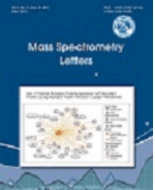
Mass Spectrometry Letters
Fostering Innovation in the Heart of Mass Spectrometry.Mass Spectrometry Letters is a pioneering open-access journal published by the Korean Society for Mass Spectrometry, specializing in the diverse fields of analytical chemistry, biochemistry, and spectroscopy. Established in 2010, this journal aims to disseminate groundbreaking research and advancements in mass spectrometry and its applications across various scientific domains. Though currently categorized in the Q4 quartile in key analytical fields, Mass Spectrometry Letters serves as an essential platform for researchers, professionals, and students to share innovative methodologies, emerging trends, and practical applications of mass spectrometry, thus fostering collaboration and advancing knowledge in the scientific community. With a commitment to open access, articles published since 2010 are readily available, enabling widespread distribution and engagement within the international research community. Located in Daejeon, South Korea, and actively converging research through 2024, the journal holds the potential to grow its impact and relevance within the dynamic landscape of mass spectrometry.

Analytical Science and Technology
Innovating methodologies for a brighter scientific future.Analytical Science and Technology is a prominent journal dedicated to advancing the fields of analytical chemistry and technology, published by the Korean Society for Analytical Science. Based in South Korea, this journal serves as a vital platform for researchers, professionals, and students committed to exploring innovative analytical techniques and methodologies. Although it is classified under Q4 in various subject categories, including Agronomy and Crop Science, Environmental Chemistry, and Pharmacology, the journal aims to provide critical insights and contributions to the scientific community. With ISSN 1225-0163 and E-ISSN 2288-8985, it spans a converged timeline from 2019 to 2024. Despite its current standings in Scopus rankings, the journal is dedicated to improving its visibility and impact through rigorous peer review and high-quality publications, fostering knowledge sharing within its diverse academic fields. Researchers looking for a reliable outlet for their findings are encouraged to consider this journal as it continues to strive for excellence in analytical science.
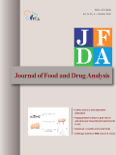
JOURNAL OF FOOD AND DRUG ANALYSIS
Advancing Knowledge in Food Safety and Drug EfficacyJOURNAL OF FOOD AND DRUG ANALYSIS, an esteemed publication in the realms of Food Science and Pharmacology, is published by DIGITAL COMMONS BEPRESS. With an impactful commitment to open access since 2013, this journal facilitates the dissemination of critical research findings, making them readily available to a global audience. Boasting a commendable Q2 ranking in both Food Science and Pharmacology, the journal occupies a prominent position in its respective categories, reflecting its quality and relevance in the field. Established in 1994, the journal has successfully converged its focus to encompass a wide range of topics related to the analysis of food and drugs, thereby providing valuable insights to researchers, practitioners, and students alike. With its indexed indicators in Scopus showcasing a strong performance—ranking #85 among 389 in Food Science and #108 among 313 in Pharmacology—it stands as a crucial platform for the advancement of knowledge and innovation. For those looking to stay abreast of pivotal developments in food safety and drug efficacy, JOURNAL OF FOOD AND DRUG ANALYSIS is an indispensable resource.
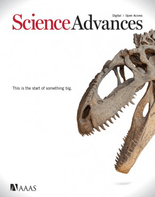
Science Advances
Exploring the Frontiers of Science TogetherScience Advances, published by the American Association for the Advancement of Science, is a leading open-access journal in the field of multidisciplinary sciences. Since its inception in 2015, it has rapidly gained prominence, achieving a remarkable Q1 ranking in both Medicine (miscellaneous) and Multidisciplinary categories, underlining its impact and relevance in contemporary research. With an impressive Scopus ranking of #7 out of 171 in the Multidisciplinary field, it proudly sits in the 96th percentile, showcasing its dedication to disseminating high-quality research across various scientific domains. This journal not only provides open access to innovative findings but also aims to foster collaboration and maintain a high standard of scholarly communication among researchers, professionals, and students globally. Stay updated with some of the most groundbreaking advancements and contribute to the collective pursuit of scientific knowledge through Science Advances.
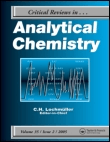
CRITICAL REVIEWS IN ANALYTICAL CHEMISTRY
Elevating Research Standards in Analytical Techniques.Critical Reviews in Analytical Chemistry, published by Taylor & Francis Inc, stands as a pivotal journal in the field of analytical chemistry, contributing significantly to its advancement since its inception in 1989. With an impressive Q1 ranking in the 2023 analytical chemistry category, it positions itself among the top 15 journals in the field, reflecting its high impact and relevance, as evidenced by a 90th percentile Scopus rank. This esteemed journal is dedicated to publishing comprehensive reviews that synthesize current research and emerging methods in analytical techniques, making it an invaluable resource for researchers, professionals, and students alike. With the goal of fostering innovation and collaboration, Critical Reviews in Analytical Chemistry continues to address challenges and breakthroughs within the sphere of analytical methodologies, ensuring its authors and readers remain at the forefront of scientific discovery.
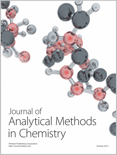
Journal of Analytical Methods in Chemistry
Empowering researchers with open access to cutting-edge findings.The Journal of Analytical Methods in Chemistry, published by HINDAWI LTD, stands as a premier platform dedicated to the dissemination of research in the vibrant field of analytical chemistry. With an ISSN of 2090-8865 and an E-ISSN of 2090-8873, this Open Access journal has been committed to providing unrestricted access to quality research since 1978, thereby fostering greater collaboration and innovation among researchers, professionals, and students globally. The journal showcases rigorous research insights spanning diverse categories, earning impressive Scopus rankings including Q2 in Chemical Engineering and Q3 in Analytical Chemistry for 2023, positioning itself effectively among respected peers. Its interdisciplinary approach also covers significant contributions in the realms of instrumentation and computer science applications, thus addressing contemporary challenges and advancements in analytical methodologies. By bridging theoretical underpinnings with practical applications, the Journal of Analytical Methods in Chemistry aims to catalyze knowledge exchange while enhancing the global discourse in analytical science.
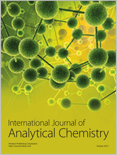
International Journal of Analytical Chemistry
Pioneering Discoveries in the Field of Analytical ChemistryInternational Journal of Analytical Chemistry, published by HINDAWI LTD, is a leading open access platform that has been advancing the field of analytical chemistry since its inception in 2009. With an ISSN of 1687-8760 and an E-ISSN of 1687-8779, this journal is headquartered in Egypt and serves a global audience, publishing high-quality research and reviews that explore innovative methodologies, techniques, and applications in analytical chemistry. Ranked in the Q3 quartile, the journal holds a notable position within its category, specifically at #90 out of 156 in the Scopus ranks for Analytical Chemistry, showcasing its impact within the scientific community. Researchers, professionals, and students can access a wealth of knowledge freely, as the journal promotes open access to facilitate the dissemination of critical research innovations. By bridging the gap between theoretical advancements and practical applications, the International Journal of Analytical Chemistry continues to play a pivotal role in shaping the future of analytical practices.
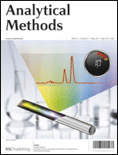
Analytical Methods
Advancing the Frontiers of Analytical ScienceAnalytical Methods, published by the renowned Royal Society of Chemistry, is a distinguished journal that has been serving the scientific community since its inception in 2009. Specializing in the fields of Analytical Chemistry, Chemical Engineering, and General Engineering, this journal holds a reputable position with an impressive Q2 ranking in three relevant categories as of 2023. With its focus on innovative methodologies and advanced applications in analytical science, it aims to disseminate cutting-edge research and foster dialogue among researchers, professionals, and students. Although it is not an open access publication, it is accessible worldwide and provides critical insights into the latest developments in analytical techniques and their engineering applications. The journal also ranks highly in pertinent Scopus categories, such as being in the 77th percentile for General Engineering and 61st percentile for Analytical Chemistry, underlining its significance in advancing knowledge and practical applications in these fields. By participating in this journal, readers can expect to engage with high-quality research that influences the future of analytical practices and chemical engineering.
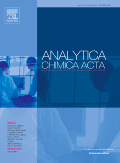
Analytica Chimica Acta
Empowering discoveries through innovative research.Analytica Chimica Acta is a prestigious peer-reviewed journal published by ELSEVIER, renowned for its significant contribution to the fields of analytical chemistry, biochemistry, environmental chemistry, and spectroscopy. Established in 1947, this journal has solidified its reputation, reflected in its impressive impact factors and Scopus rankings, including a Q1 classification in Analytical Chemistry and Spectroscopy, and a Q2 ranking in both Biochemistry and Environmental Chemistry. With its comprehensive scope, Analytica Chimica Acta aims to publish innovative research, critical reviews, and technical notes that advance the understanding and application of analytical methods. As an essential resource for researchers, professionals, and students alike, it encourages the dissemination of high-quality research that addresses contemporary challenges in chemical analysis and promotes interdisciplinary collaboration. While the journal operates primarily on a subscription basis, it also offers unique opportunities for authors to reach a broad audience and engage in the global scientific discourse.